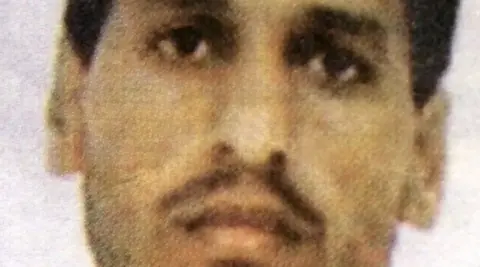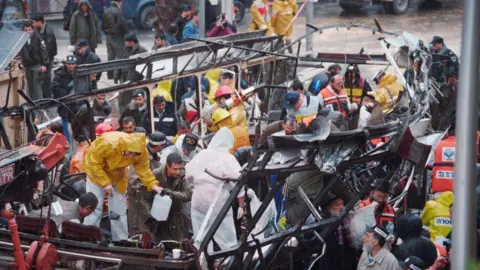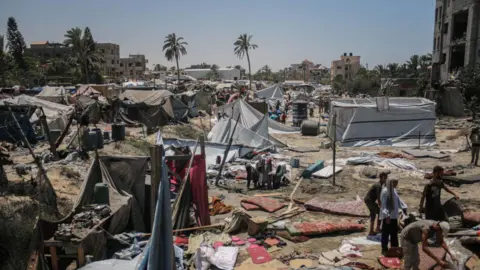 AFP
AFPIsrael’s military says it has confirmed that Hamas’s military chief Mohammed Deif was killed in an Israeli air strike in the Gaza Strip last month.
Deif was targeted in the strike on a compound in the Khan Younis area on 13 July. Hamas is yet to confirm his death.
Israel says Deif was one of the figures responsible for planning the 7 October attacks in southern Israel in which 1,200 people were killed and 251 taken hostage.
On Wednesday, Hamas political leader Ismael Haniyeh was killed during a visit to Iran. Israel has not commented on his death directly.
In a statement on Thursday, the Israeli military said that “following an intelligence assessment, it can be confirmed that Mohammed Deif was eliminated” in the 13 July strike.
Gaza’s Hamas-run health authorities said at the time that the air strike had killed more than 90 people, but denied that Deif was among the dead.
Deif was widely seen as the second-ranking Hamas official in Gaza, behind Yahya Sinwar, the group’s leader in the territory.
Israel’s Defence Minister, Yoav Gallant, said the death of Deif is “a significant milestone” in the dismantling of Hamas.
“This operation reflects the fact that Hamas is disintegrating, and that Hamas terrorists may either surrender or they will be eliminated,” he added.
What do we know about Mohammed Deif?
Mohammed Deif was appointed head of the Izzedine al-Qassam Brigades, the military arm of the Hamas movement, in 2002.
For decades he’s been seen as one of Israel’s most wanted men – and survived a reported seven assassination attempts.
Reports in Israeli and Palestinian media say that Deif was born in Gaza’s Khan Yunis refugee camp in 1965, when the territory was occupied by Egypt.
As a young man in the 1980s, he joined Hamas and quickly rose to prominence.
Israel accused him of planning and supervising bus bombings which killed tens of Israelis in 1996, and of involvement in the capture and killing of three Israeli soldiers in the mid-1990s.
 AFP
AFPDeif is also known to have helped engineer the construction of tunnels that have allowed Hamas fighters to enter Israel from Gaza.
In 2014, Israel attempted to kill Deif with an air strike on a house in the Sheikh Radwan neighbourhood of Gaza, which killed Deif’s wife, Widad, and their infant son, Ali. Israel thought it had killed Deif, too, but he was not in the building at the time.
During the current conflict, Deif is believed to have directed Hamas’ military operations from within underground tunnels inside Gaza.
 Getty Images
Getty ImagesIsrael’s confirmation of Deif’s death comes at the end of a turbulent week in the Israel-Gaza conflict, which has stoked fears of a broader regional war.
On Saturday, 12 Israeli children and young people were killed after a rocket fell on a football field in the Israeli-occupied Golan Heights. Israeli Prime Minister Benjamin Netanyahu blamed Lebanon-based Hezbollah, saying they would pay “a heavy price”.
On Tuesday, Israel retorted with air strike on Beirut which killed senior Hezbollah commander Fuad Shukr, as well as four others, including two children.
Hours later, Hamas’s political leader Ismael Haniyeh was killed in a strike on a building he was staying in during a visit to Iran’s capital, Tehran.

